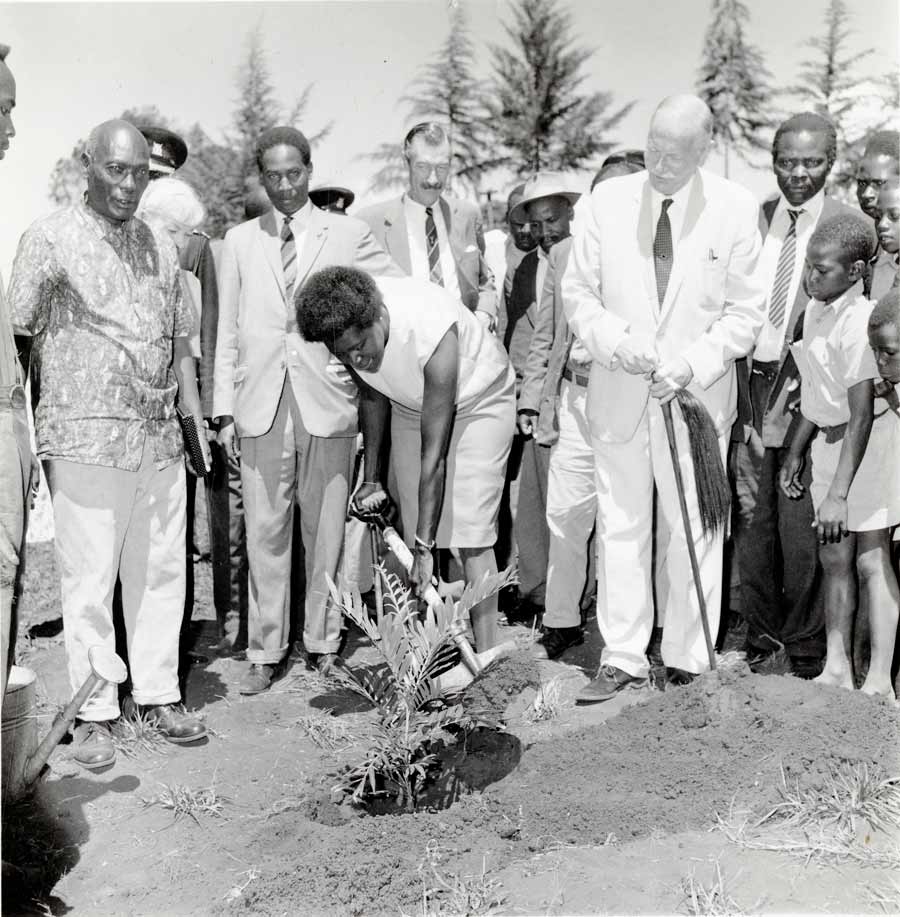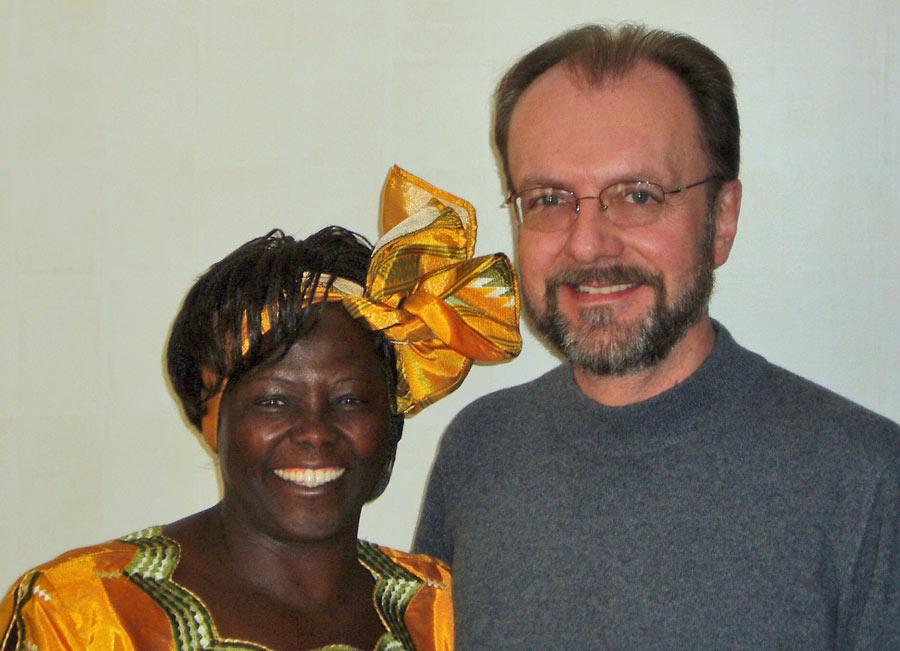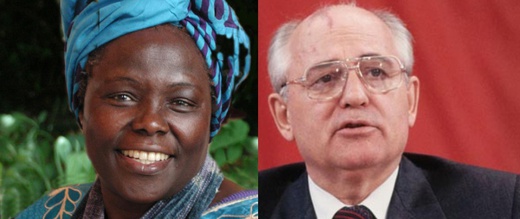The views expressed in our content reflect individual perspectives and do not represent the authoritative views of the Baha'i Faith.
Two courageous Nobel Laureates—Mikhail Gorbachev and Wangari Maathai—have a connection that few people know about. I’ll tell you here.

Wangari Maathai planting a tree in 1977 with the co-founders of the Men of the Trees, Richard St. Barbe Baker (to her right in white suit) and Chief Josiah Njonjo (far left).
As I began to write a comment to thank Jaine Toth for reminding us of the indomitable spirit of Wangari Maathai in her BahaiTeachings.org essay Africa’s “Woman of the Trees” on May 11, 2017, the memories kept flowing and the resulting word count quickly became more than would fit in a comments box. So please consider the following as my extended thank you and response to Jaine.
Wangari Maathai met Richard St. Barbe Baker, known as the “Man of the Trees,” at a 1977 UN Conference on Desertification in Nairobi where she had organized a tree planting event for the delegates. Two years later I subsequently met St. Barbe, as we all called him, and we worked together until his passing in 1982. He told me about Wangari, and some years afterwards I introduced myself to her at a conference and mentioned our inspiring mutual friend.
St. Barbe, one of the world’s pioneering environmentalists and a dedicated Baha’i, truly exemplified the Baha’i teachings about respect for the power, the diversity and the splendor of the natural world:
Nature in its essence is the embodiment of My Name, the Maker, the Creator. Its manifestations are diversified by varying causes, and in this diversity there are signs for men of discernment. Nature is God’s Will and is its expression in and through the contingent world. It is a dispensation of Providence ordained by the Ordainer, the All-Wise. Were anyone to affirm that it is the Will of God as manifested in the world of being, no one should question this assertion. It is endowed with a power whose reality men of learning fail to grasp. Indeed a man of insight can perceive naught therein save the effulgent splendour of Our Name, the Creator. Say: This is an existence which knoweth no decay, and Nature itself is lost in bewilderment before its revelations, its compelling evidences and its effulgent glory which have encompassed the universe. – Baha’u’llah, Tablets of Baha’u’llah, p. 141.
My book “The Haiti Experiment” (Hawkeye Publishers, 2012) is dedicated to both St. Barbe and Wangari with the following inscription:
To forester, author and environmentalist Richard St. Barbe Baker (1889-1982), with warmest thanks for being my mentor in service to humanity and my guide to a life well lived.
And to Wangari Maathai (1940 – 2011), founder of the Green Belt Movement and winner of the 2004 Nobel Peace Prize, with deep gratitude for your example, your message, and your friendship.
While Wangari and I kept running into each other at conferences, an unusual series of events in 1993 forged a deep and lasting bond.

Wangari Maathai & Hugh Locke
These events also involved a conference, but this time Wangari was not present. The conference in question was taking place in Kyoto, Japan, to mark the launch of Green Cross International under the leadership of Mikhail Gorbachev, who had retired as President of the Soviet Union in 1991, having himself won the Nobel Peace Prize in 1990.
In a very large room with fixed desks arranged in a circle reminiscent of a formal UN setting, President Gorbachev opened the proceedings with a roll call of the many distinguished international environmental and political figures who had agreed to serve as members of the board of directors or honorary board. One by one they signaled their presence, but when he called Wangari’s name, a conference official said, “We have received a message saying she is in hiding in Kenya and was unable to get the necessary travel documents to leave the country.” President Gorbachev replied, “That is unfortunate and something should be done to assist her.”
I was sitting at the back of the room and the exchange caught my attention, in part because I had been one of the people originally putting Wangari’s name forward for board membership. At the same time I was waiting for someone to follow up President Gorbachev’s suggestion of assistance. It was widely known at the time that Wangari was under threat because of her environmental activism, but the fact that she was now in hiding suggested a serious escalation of the harassment against her. However, no such action was forthcoming and the meeting quickly moved on to the next agenda item.
I realized at that moment that it was up to me to instigate action, and so I began composing a letter from President Gorbachev to then Kenyan President Daniel arap Moi, in which Gorbachev asked him to take personal responsibility for helping to arrange for Wangari’s travel documents and ensuring her safety and protection.
In the next essay, I’ll tell you what happened.

















Comments
Sign in or create an account
Continue with Facebookor